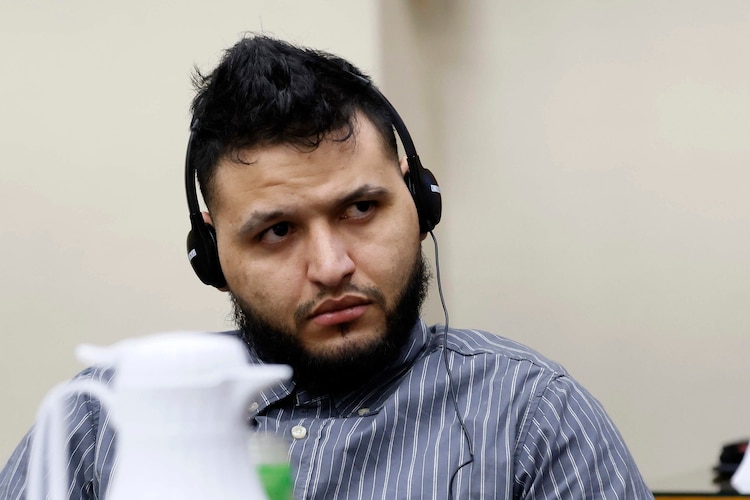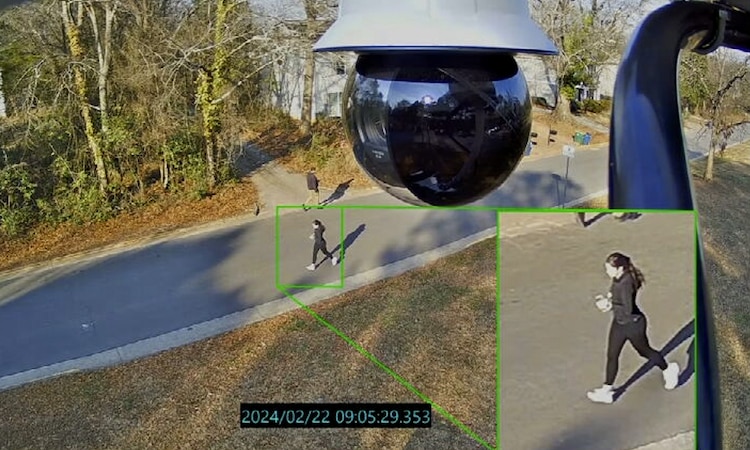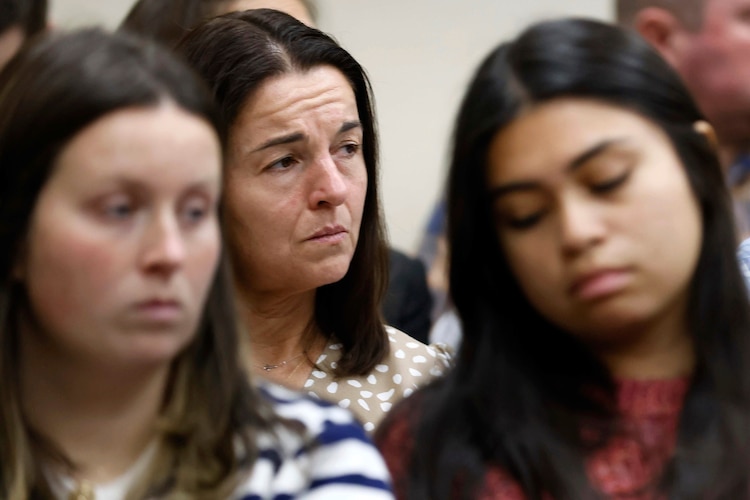Current Events
Author: anonymDate: 2024-11-20 17:06:31
Chronology: Reconstruction of Laken Riley's final moments during the Georgia nursing student's murder trial
Jose Ibarra is accused of killing the 22-year-old while she was out on a run.
The sequence of events leading up to Laken Riley's demise during a jog on the University of Georgia campus were presented in court on Tuesday, the third day of the trial concerning the 22-year-old nursing student's killing. The Augusta University student was discovered lifeless in a wooded area on the Athens campus on February 22nd. Jose Ibarra, 26, stands accused of Riley's murder after prosecutors asserted she "rejected his attempt at sexual assault." Ibarra, an undocumented immigrant, faces charges of intentional murder and felony murder related to her death, which sparked calls for immigration reform among numerous conservative voices, including President-elect Donald Trump.

On the morning of the homicide, at 8:55 a.m., Riley sent a text message to her mother, Allyson Phillips, stating, "Good morning, about to go for a run if you're available for a chat," according to University of Georgia Police Sgt. Sophie Raboud, a primary investigator in the case, who provided testimony on Tuesday regarding Riley's phone usage. Riley contacted her mother at 9:03 a.m., then commenced listening to music, Raboud stated. She was recorded by a trail camera at 9:05 a.m. jogging with her iPhone in her left hand towards the intramural fields, Raboud indicated. She vanishes from the camera's view at 9:06 a.m. At 9:11 a.m., she dialed 911, Raboud reported. Prior witnesses testified that Riley initiated the call using her phone's emergency application. The dispatcher couldn't connect with anyone before the call ended and made two return calls without a response, according to the witnesses. At 9:24 a.m., Riley received a call from her mother which remained unanswered, Raboud said. At 9:38 a.m., her mother texted, "Contact me when you're able," Raboud stated.
Raboud mentioned Riley's mother repeatedly tried contacting Riley without success, before texting at 9:58 a.m., "I'm getting anxious, you're not answering while you're out running. Are you alright?" Riley received subsequent calls from her mother and sister that went unanswered, Raboud said.

Further calls, including one from her stepfather, also went unanswered, Raboud testified. Trail camera footage from later that morning displayed in court showed Riley's housemates, Lilly Steiner and Sofia Magana, on the path searching for her. Riley's roommates reported her missing at 12:05 p.m., and a University of Georgia police officer located her body 65 feet from the trail at 12:38 p.m., as previously testified by witnesses. Data from her Garmin fitness tracker indicated her heart stopped at 9:28 a.m., as previously stated by witnesses. Riley suffered severe blunt force trauma to her head, including eight injuries to the left side of her skull and one just above her right temple, Dr. Michelle DiMarco, who performed her autopsy, testified on Tuesday. One injury was severe enough to induce cerebral hemorrhage and could have been fatal, she explained. There was also evidence of suffocation, although DiMarco stated she couldn't specify the method. Her cause of death was determined to be the "combined effects of blunt force head trauma and asphyxiation," DiMarco stated.
DNA evidence matched Ibarra, expert says
Ibarra was interviewed on February 23rd in relation to her death and had multiple visible scratches on his arms, police testified. The suspect's DNA was found under Riley's right fingernails, according to Ashley Hinkle, a forensic scientist at the Georgia Bureau of Investigation who analyzed the evidence. The likelihood of the DNA belonging to anyone other than Ibarra was one in 10 billion, she stated during Tuesday's testimony. Ibarra's two brothers were ruled out as potential matches, she noted. A man was recorded on a trail camera on the morning of the murder heading towards the intramural fields shortly before 8 a.m., Raboud said. Prosecutors suggested the individual was wearing attire similar to what Ibarra had on in a Snapchat selfie posted earlier that morning, including a black Adidas hat. Ibarra was also seen discarding a bloodstained coat and disposable gloves near his residence on February 22nd at 9:44 a.m., prosecutors stated.

Hairs recovered from the coat were determined to have originated from Riley or "an individual with hair exhibiting identical unique features," Anne Kisler-Rao, with the Georgia Bureau of Investigation's crime lab, testified on Tuesday. Riley's and Ibarra's DNA profiles were found on the coat, Hinkle testified. Ibarra's two brothers were excluded as matches, she noted. Riley's DNA was also discovered on the gloves, Hinkle said. The probability of it not being hers is 1 in 500 octillion, she said. The gloves contained the DNA profile of at least one additional person, though no conclusions were drawn about their identity, she stated. The defense attempted to discredit some of the DNA testing, which incorporated a comparatively novel technique called TrueAllele, and also questioned the considerable variation in the statistical probabilities of matches. Hinkle stated the GBI has validated the TrueAllele system, and that the probabilities differed based on the item being examined. The gloves, which were recovered from a bush near Ibarra's residence, were determined to match those found in a drawer in his apartment, GBI specialist Alexander Covin testified on Tuesday. Under cross-examination by the defense, Covin conceded that the gloves might have matched but could also have come from separate sources.
Ibarra waives right to testify
The prosecution concluded its case on Tuesday. Ibarra waived his right to give evidence in his own defense. One of the defense witnesses included a woman who resided in the same apartment complex as Ibarra, who shared his apartment with multiple individuals, including his two brothers, Diego and Argenis. The witness, Stephanie Slaton, testified that Diego Ibarra threatened her on the night of Riley's murder. She said he inquired about police activity at their apartment complex's dumpster, and she told him that someone had "passed away at the rear of our building." She said she informed him that if he had witnessed or heard anything unusual, "you need to report it now" to law enforcement. Using a translation application to convert his words from Spanish to English, she stated he wrote her, "If you tell them, I will claim you did it, and then I will kill you, too.” Under cross-examination, Slaton said she informed the Georgia Bureau of Investigators about that encounter with Diego Ibarra. Asked what he meant by "tell them," Slaton replied, "I cannot speculate on his motives." Diego Ibarra was scheduled to be called as a defense witness on Tuesday, but defense attorney Dustin Kirby informed the judge that the brother's lawyer intends to advise him against testifying due to a pending federal sentence.
Diego Ibarra was apprehended for possessing an illegal visa, following questioning by police in the Riley case. He has admitted guilt to possessing a fraudulent green card. He faces a maximum of 10 years imprisonment followed by up to three years of supervised release. Judge H. Patrick Haggard stated that if the attorney does not want Diego Ibarra to testify, there is no justification to proceed with him. Kirby also indicated there is another federal inmate the defense wishes to call as a witness if Diego Ibarra does not testify. "We would then request to call our next witness and allow them to testify to statements they heard from Mr. Diego Ibarra, given Diego Ibarra is now unavailable," Kirby said. The court adjourned for the day and is scheduled to reconvene Wednesday morning. Ibarra has pleaded not guilty. He waived his right to a jury trial and the case is being presented in the Athens-Clarke County courtroom to Haggard, who will deliver a verdict. Police have stated they believe Ibarra -- a migrant from Venezuela who authorities said illegally entered the U.S. in 2022 -- did not know Riley and that this was a "crime of opportunity."